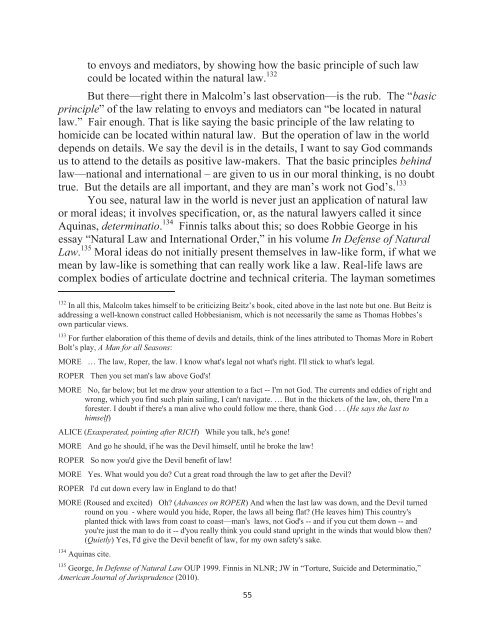International Legal Evangelism: Intelligence, Reconnaissance & Missions
International Legal Evangelism: Intelligence, Reconnaissance & Missions
International Legal Evangelism: Intelligence, Reconnaissance & Missions
You also want an ePaper? Increase the reach of your titles
YUMPU automatically turns print PDFs into web optimized ePapers that Google loves.
to envoys and mediators, by showing how the basic principle of such law<br />
could be located within the natural law. 132<br />
But there—right there in Malcolm’s last observation—is the rub. The “basic<br />
principle” of the law relating to envoys and mediators can “be located in natural<br />
law.” Fair enough. That is like saying the basic principle of the law relating to<br />
homicide can be located within natural law. But the operation of law in the world<br />
depends on details. We say the devil is in the details, I want to say God commands<br />
us to attend to the details as positive law-makers. That the basic principles behind<br />
law—national and international – are given to us in our moral thinking, is no doubt<br />
true. But the details are all important, and they are man’s work not God’s. 133<br />
You see, natural law in the world is never just an application of natural law<br />
or moral ideas; it involves specification, or, as the natural lawyers called it since<br />
Aquinas, determinatio. 134 Finnis talks about this; so does Robbie George in his<br />
essay “Natural Law and <strong>International</strong> Order,” in his volume In Defense of Natural<br />
Law. 135 Moral ideas do not initially present themselves in law-like form, if what we<br />
mean by law-like is something that can really work like a law. Real-life laws are<br />
complex bodies of articulate doctrine and technical criteria. The layman sometimes<br />
<br />
132 In all this, Malcolm takes himself to be criticizing Beitz’s book, cited above in the last note but one. But Beitz is<br />
addressing a well-known construct called Hobbesianism, which is not necessarily the same as Thomas Hobbes’s<br />
own particular views.<br />
133 For further elaboration of this theme of devils and details, think of the lines attributed to Thomas More in Robert<br />
Bolt’s play, A Man for all Seasons:<br />
MORE … The law, Roper, the law. I know what's legal not what's right. I'll stick to what's legal.<br />
ROPER Then you set man's law above God's!<br />
MORE No, far below; but let me draw your attention to a fact -- I'm not God. The currents and eddies of right and<br />
wrong, which you find such plain sailing, I can't navigate. … But in the thickets of the law, oh, there I'm a<br />
forester. I doubt if there's a man alive who could follow me there, thank God . . . (He says the last to<br />
himself)<br />
ALICE (Exasperated, pointing after RICH) While you talk, he's gone!<br />
MORE And go he should, if he was the Devil himself, until he broke the law!<br />
ROPER So now you'd give the Devil benefit of law!<br />
MORE Yes. What would you do? Cut a great road through the law to get after the Devil?<br />
ROPER I'd cut down every law in England to do that!<br />
MORE (Roused and excited) Oh? (Advances on ROPER) And when the last law was down, and the Devil turned<br />
round on you - where would you hide, Roper, the laws all being flat? (He leaves him) This country's<br />
planted thick with laws from coast to coast—man's laws, not God's -- and if you cut them down -- and<br />
you're just the man to do it -- d'you really think you could stand upright in the winds that would blow then?<br />
(Quietly) Yes, I'd give the Devil benefit of law, for my own safety's sake.<br />
134 Aquinas cite.<br />
135 George, In Defense of Natural Law OUP 1999. Finnis in NLNR; JW in “Torture, Suicide and Determinatio,”<br />
American Journal of Jurisprudence (2010).<br />
<br />
55

















